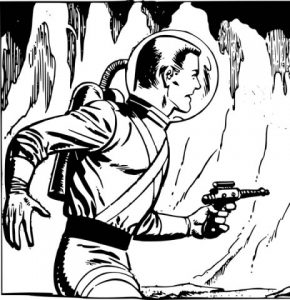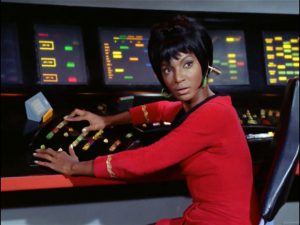I fell in love with science fiction back in the 1960’s when I was 11 or 12-years old. My mother worked for a printing company and she would bring home books and magazines for us all to read. She could often be seen with her head buried in an Ellery Queen or Alfred Hitchcock novel, so we learned to enjoy reading from her example. One day she brought home a novel by Isaac Asimov. I read it and was hooked.
 As a kid, I consumed sci-fi in every form, books, comic books, TV, movies and even radio. As I got older, my tastes became a little more sophisticated. Forbidden Planet by Disney, for example was a favorite and Kubrick’s 2001: A Space Odyssey was life changing. Like most people, when I read, see or hear these great adventures, I like to imagine myself in the story. Sometimes the hero, sometimes another interesting character. What would I do or how would I feel? There was always one little problem. I was (and still am) a black American. In none of my favorite books, TV shows or movies back then were there any black characters. This made it difficult to identify. During the early years of the American space program, I was a big fan. I’d be late for school on mornings when there was a launch broadcast live on TV. But it was hard for a black kid to dream of being an astronaut where there were no black astronauts.
As a kid, I consumed sci-fi in every form, books, comic books, TV, movies and even radio. As I got older, my tastes became a little more sophisticated. Forbidden Planet by Disney, for example was a favorite and Kubrick’s 2001: A Space Odyssey was life changing. Like most people, when I read, see or hear these great adventures, I like to imagine myself in the story. Sometimes the hero, sometimes another interesting character. What would I do or how would I feel? There was always one little problem. I was (and still am) a black American. In none of my favorite books, TV shows or movies back then were there any black characters. This made it difficult to identify. During the early years of the American space program, I was a big fan. I’d be late for school on mornings when there was a launch broadcast live on TV. But it was hard for a black kid to dream of being an astronaut where there were no black astronauts.
I lived in a world where it seemed the best that a black man could do was excel in sports. It was indeed my grandfather’s dream that I would become a professional baseball player. The fact that I got great grades in school and loved science made no difference. Probably because he felt that it wouldn’t make any difference to anyone else. Sadly, I was a klutz. Whenever I played sports at school I would often cause my team to lose and get chased home afterwards. I was never going to be an Ernie Banks.
It wasn’t until Star Trek came on the air that I could imagine a future that included black people, and other races, even non-human. A future where  women worked and served along with the men. In fact, Gene Roddenberry actually performed a “double whammy” with Lt. Uhura. A black woman in a command role. Then when the movies and Star Trek: The Next Generation came along, we saw starship captains and admirals who were black, white, male, female and members of seemingly every human racial group and a wide variety of aliens. I fell in love with Star Trek and sci-fi all over again. I hoped that this was what the future would be like. And, as it turned out, it was Star Trek (and the work of Nichelle Nichols) who helped break the racial and gender barriers in NASA.
women worked and served along with the men. In fact, Gene Roddenberry actually performed a “double whammy” with Lt. Uhura. A black woman in a command role. Then when the movies and Star Trek: The Next Generation came along, we saw starship captains and admirals who were black, white, male, female and members of seemingly every human racial group and a wide variety of aliens. I fell in love with Star Trek and sci-fi all over again. I hoped that this was what the future would be like. And, as it turned out, it was Star Trek (and the work of Nichelle Nichols) who helped break the racial and gender barriers in NASA.
So now we’re in the 21st Century. When you look at TV, movies, and print, there are more women, blacks and other ethnicities. We’re getting there.
Back when I was a child, reading I, Robot and other classic sci-fi novels for the first time, I dreamed, not only of being the characters in these great stories, but of writing my own sci-fi epics. In high school, I made feeble attempts to write some short stories and even what I guess would be novellas. My own sci-fi adventures and spy thrillers (I was also a James Bond fan, no big surprise there).
Now I try to write stories for and about “real people.” Science fiction happens to all kinds of people, male, female, white, black, straight, gay, you name it. And I am hoping that it not get pigeon holed as “Black science fiction” or “Gay science fiction.” Just good sci-fi. The race, or orientation of the characters would only add flavor to the story.
Along with that, I also like to make the characters ordinary people. They can be exceptionally smart or have unusual background experience, but they are still regular people. As one of the people who reviewed my novel The Chronocar said: “What if the person who constructs and uses a time machine ISN’T a genius scientist who has considered all the ramifications?”
So I invite you to enjoy my work. There will be a lot more in the coming months and years. And please, let me, and the world, know what you think!
